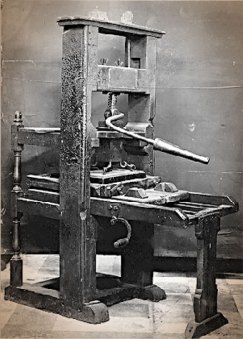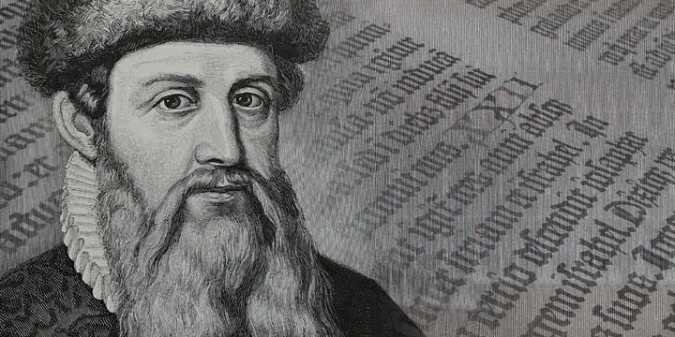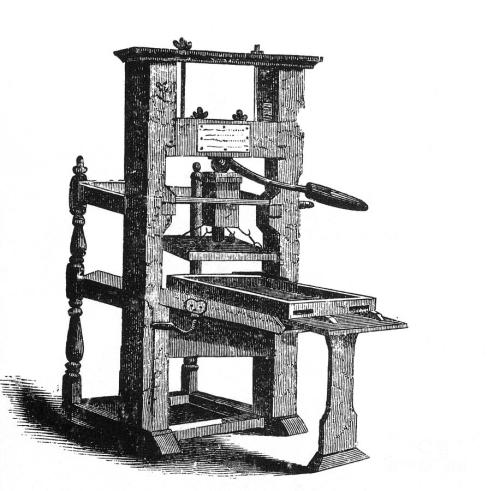The printing press was invented around 1440 by Johannes Gutenberg in Germany. He used the press to print 200 copies of the Bible in 1452 and sold them in 1455. He wanted to keep his technique of printing, which involved having moveable letters that you can place in order to make a full page and then reset and reuse the letters to make other pages, a secret, but obviously this was not the case, as there were about 2500 European cities with printing presses by 1500. (1)
The invention of the printing press had a huge impact on society, for the first time ever writers could publish their work and people from all over could read what they had to say. Philosophers took advantage of this and spread their ideas far and wide. Since so much information was being spread through writing, literacy rates increased throughout Europe.
Without the printing press, the age of Enlightenment would have been a much different time. It’s strange to think how important something like a printer is. The fact that people were able to communicate to large audiences without having to be geographically close to them is an amazing development in history.
There was normally a printing press in each city, so they weren’t very hard to find. This revolutionary invention allowed people to spread their own ideas and thoughts and was a major advancement toward free speech. (1)
The printing press prevented possible corruption that could happen when hand copying a work and since every copy was the same, progress in education could take place much more rapidly. People had greater access to works of all kinds, religious, medical, business, educational, etc. This allowed the general public to be more educated and furthered the advancement of the arts and sciences, which were both major focuses of the Enlightenment.(2)
Jean Jacques Rousseau believed that the only reason philosophers were famous and well known was because their works were published. He thought that there were probably philosophers in each generation, but we just don’t know about them because there was no way of them becoming famous other than traveling and constantly giving speeches all over. He also believed that philosophy, sciences, and the arts were the downfall of empire, so maybe he thought that the fact that there weren’t printing presses then perpetuated the empires of the time. (3)
One of the biggest impacts of the printing press was through religion. Thanks to the invention, Protestantism spread all throughout Europe through the printing of Christian Bibles and there was a decline in Catholicism in Western Europe. Prior to the invention of the printing press most Bibles and other books were printed in Latin, a language that only well-educated people could understand. After the printing press was invented, however, they were printed in other languages which allowed many more people to study both religious and scholarly books.(4)
The fact that the Bible was printed in Latin allowed for there to be corruption in the Catholic church. There was a lot of corruption in the Roman Catholic Church during and prior to the 1500s, Martin Luther posted the “95 Theses” on the outside of the Castle Church in Wittenberg, Germany. These sparked the Reformation and the forming of Protestantism throughout Europe. The printing press helped to start this want for change in the church. Since Bibles were available in common languages and were not expensive, people were able to study the Bible on their own and make their own interpretations of what they read rather than just listening to the church as they always had.(5)
Nowadays when you think of something as basic as a printer you don’t think of the immense impact it had when it was invented. Without the printing press, education would not have progressed as it has, information would not have been spread as effectively or as efficiently, and religion would not have changed in the same way that it did.
Printing presses very similar to the one that Johannes Gutenberg invented were used up until the 1900s, when more modern printers were invented.(6) This proves that Gutenberg’s invention was extremely advanced, as it was not replaced until several centuries after it was invented. Where would we be without such a revolutionary invention?
(3) Rousseau, Jean-Jacques. The Basic Political Writings. 2nd ed. Indianapolis: Hackett, 2011. Print.




I am sure this post has touched all the internet viewers, its really really nice article on building
up new blog.
LikeLike
First of all I really like the fact that you started with the fact that the first ever book printed using a printing press was the Bible and how you later visited the implications of what this meant for religion, because when I started reading you post the first thing that came to my mind when I saw that fact was the way in which the printing press affected people’s religious beliefs. And I feel like the way that the printing press lead to more people being able to come to their own conclusions about religion and judging the church based off of their new found understanding of the Bible supports Kant’s thoughts on Enlightenment as something that happens when the individual no longer just believes what they are told but rather are able to use reasoning in order to come to a conclusion on how they should proceed in the future. I like the way that your links are easy to find and at the same time don’t interfere with the text and the way that you have multiple pictures that go well with your post. I would like to know what you think about the impact of the printing press and if you think that in the terms of Enlightenment if the effect of the printing press was positive or negative?
LikeLiked by 1 person